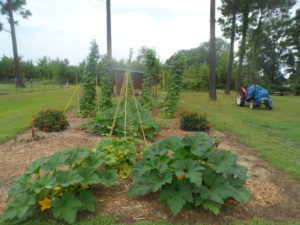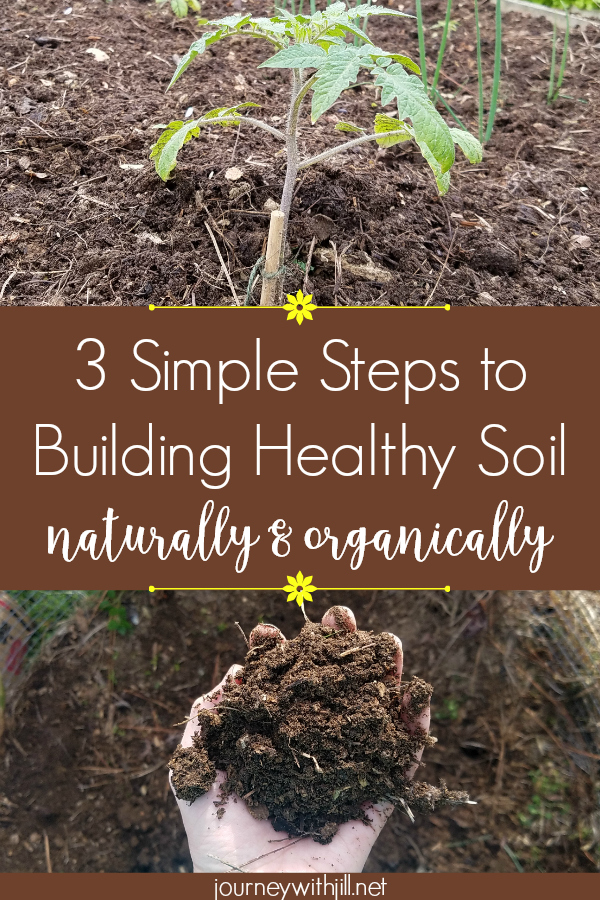Building Healthy Soil – Interview with the Organic Gardener Podcast’s Jackie Marie Beyer
In my first year to get serious about gardening, healthy soil didn’t cross my mind. Not really, anyway. I had other things to worry about, like which plants to grow and when to plant them.
Because of a conviction to grow as organic of a garden as possible, I had no plans to purchase conventional fertilizer and I planned to try my hand at composting, but that’s about as far as it went.
And, my first year, I’m pretty proud of how healthy my garden ended up.

But as the years went on and production slowed a bit, I realized I needed to focus on soil health and fertility. Just like humans burn energy we consume in food, plants also take up nutrients from the soil. Without a plan in place to replace those nutrients, we’ll find our garden less healthy, less productive, and more prone to pest damage and disease.
On this episode of the Beginner’s Garden Podcast, I chat with Jackie Marie Beyer of the Organic Gardener Podcast about this very subject. Jackie talks to garden experts all over the world and she’s pretty passionate about growing a natural, organic, healthy garden.
In our chat, we talk about building healthy soil through compost and other methods, and we compare how her short-season garden in Montana compares to my long-season garden in Arkansas. Click to listen to our conversation, and I’ve included the highlights of our conversation and the resources she mentions below.
Start Making Your Own Compost
Making your own compost at home isn’t as hard as it seems, and all you have to do is start with what you already have. By re-using your kitchen, animal, and yard waste, you’re building the foundation of long-term soil fertility.
Get started by compiling waste you may already have like:
- grass clippings (don’t use if you’ve used herbicides or pesticides on it!)
- crushed up egg shells
- coffee grounds
- banana peels
- autumn leaves (mow over them to break them into smaller pieces)
Click here to listen to my podcast on Composting Basics for the Beginner.
Use Animal Manure Safely in Your Garden
Chicken, cow, and goat manure can be gold both in your compost pile and also as a fertilizer in themselves for your garden. But here are some cautions:
- Make sure the manure has aged for several months — either on its own or in a compost pile — before placing it directly in the garden. Composted manure shouldn’t smell like manure or have clumps like fresh manure has.
- Ensure that the livestock has not eaten weed-free hay. If the hay is weed free, most likely it had been treated with weed-killer, which can remain in tact when you place it in your garden. This, in turn, can destroy your garden both this season and in seasons to come.
Organic Fertilizer Options
*Some links below are affiliate links, which means if you click through and make a purchase, I will be compensated at no extra cost to you. See my full disclosure at the bottom of this page.
If you can’t make enough compost for your garden or if you notice your plants need a boost, there are a multitude of organic options available, such as:
Jackie’s Top Garden Tips
Jackie talks with scores of experts in the field of gardening, and I asked her to list her top tips for beginning gardeners from her interviews on the Organic Gardener Podcast:
- Make sure you know what you’re fertilizing your garden with. Know the source of your compost and any animal manure you use.
- Start small.
- Grow what you’re going to eat.
Resources Jackie Recommends
- Elliot Coleman’s book Four Season Harvest
- Anna Hess’s book Homegrown Humus
- Article by Rodale Organic Life, Everything You Need to Know about Organic Fertilizer
- The Broadfork for aerating the soil without tilling
Connect further with Jackie Marie Beyer on her podcast, the Organic Gardener Podcast here.
Do you get overwhelmed with garden planning?

Subscribe here for my best tips to plan your garden in just 7 days -- all for FREE.
Plus, I'll send you my "In the Garden E-mail" on Fridays, periodic updates on garden resources relevant to you, and you'll receive access to my entire bank of free garden downloads!
You are also agreeing to our privacy policy.


My daughter and I have been planting gardens now for three years now. Ever year we add on a new area and crop to grow. The problem we are starting to have is the water bill is starting to get a little out of control in the summertime. I’m looking for any ideas on how much we should water. We are thinking about collecting rain water in a barrel but does that really work well. We live in Massachusetts. We have about 4-5 months to garden. I have been getting a lot of good tips from your site here. Can’t wait to get gardening. ???
That’s a great question, Mark, and one I plan on discussing on a future podcast and post. For now, I’d recommend if you haven’t yet, use a soaker hose or drip irrigation system, and water early in the morning. We have a timer that turns ours on at 4 a.m. These methods will minimize evaporation and make the most of the water you do use, allowing you to use less. As far as a rain barrel goes, we used to use it but since we moved our garden away from our house, it was no longer feasible. I hope to do it again someday, using the roof of the chicken coop. The only drawback is the water pressure. But for a small garden area near the house, many have found it an ideal way to irrigate.